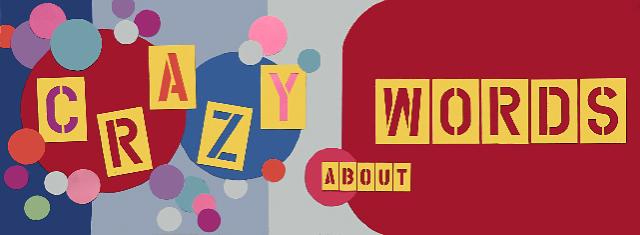Inkhorn terms
Joe Mc Kay’s “Crazy About Words”
…toasting our language since 2003!
It’s a shame that this noun phrase is no longer in common use. I discovered it recently in The Word Museum: The Most Remarkable English Words Ever Forgotten, by Jeffrey Kacirk. I was relieved to know it, because I have long felt at a loss for what to call all the wonderful words, phrases, and expressions writers come up with to make our language more vivid. I have, at times, referred to them as “writerly” inventions, but that’s not a name that sticks as “inkhorn terms” once did.
The words that writers and speakers invent or derive to enhance and color our communications, ought to have a name. If the “tips of shoelaces” deserve “aglets” (from French, aguille for needle), then surely a noble handle is due what were once called “inkhorn terms.”
I understand how it faded from use. Who knows anymore what the heck an “inkhorn” is? … even “ink” is not understood as it once was … perhaps better known now as the fluid an octopus employs for defense than as the medium of writers. Animal horns were used, like powderhorns, to carry quills and ink and were once a symbol of the writer’s trade.
“Inkhorn term” was originally used derisively in the late 1500s, (during the transition from Middle English to Modern English), by purists defending the Anglo-Saxon language against the incursion of Latin, Greek, and French words being introduced by writers to combat the limitations of the largely four-letter-word A-S vocabulary. “The most ancient English wordes are of one syllable, so that the more monosyllables you use, the truer Englishman you shall seem, and the less you shall smell of the Inkhorne.” George Gascoigne, 1575.
The purists agreed that the language needed more words, but thought they could be created out of what people already knew. Had they prevailed, we might today be using simple, derivative words such as ‘gleeman’ for musician, ‘inwit’ for conscience, ‘yeartide’ for anniversary, ‘starlore’ for astronomy, and ‘speechcraft’ for grammar. But language progressives won the day and a flood of Renaissance-era inkhorn words were embraced. Among them: anonymous, catastrophe, expectation, lunar, and pathetic.
Modern English continues to expand as it begs the imaginations of people who love language, borrows from other languages, and steals outright from everywhere. “Hedonists” were simply “pleasure seekers” until someone went for the Greek root in the mid 1800s. “Humongous” combined “huge” and “monstrous” on a U.S. college campus in 1967 and spread like wildfire into everyday use. “Wildfire” is an invented word that relies on the double meaning of ‘wild’ for its sense; in Spanish, one has to say “incendios en areas naturales” and even that long phrase doesn’t capture the rage involved.
Because of this expansive quality born of the “Inkhorne Controversy,” English today is the “go-to” language for people around the world seeking common ground in communication. The origin of “dust bunny” cannot be traced beyond the fact of its U.S. origin, but you might well hear the term in the middle of a sentence spoken in another language. Similarly, “control freak,” “bunker mentality,” “brain trust” and “shazam” are modern terms originated by writers, but lacking a word that defines them.
I believe that if you hundreds of “Crazy About Words” readers put your minds to it, we’ll come up with a good idea for a word or phrase that redefines these “inkhorn terms” for modern times. Then I’ll work to spread it around among dictionary editors. So, let’s try some crowdsourcing.
Send your ideas to crazyaboutwords@gmail.com
Joe Mc Kay
May 2012






